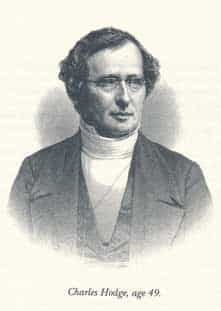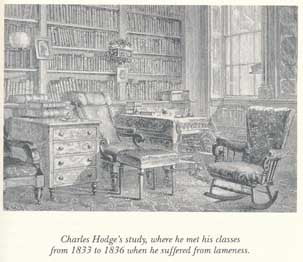The beginning of an illustrious career. Dr. Charles Hodge was appointed the third professor at the Princeton Theological Seminary on this day, May 24, 1822.
 Of Charles Hodge, the eminent Scottish theologian William Cunningham often said “that he had greater confidence in the theological opinions of Charles Hodge than in those of any other living theologian.”
Of Charles Hodge, the eminent Scottish theologian William Cunningham often said “that he had greater confidence in the theological opinions of Charles Hodge than in those of any other living theologian.”
Born in 1797, Charles was raised in Philadelphia by his widowed mother and later graduated from the College of New Jersey (now Princeton University) in 1815, and then Princeton Seminary in 1819. Ordained by the Presbytery of New Brunswick in 1821, Hodge was appointed as stated supply over the church in Georgetown (now Lambertville). Though he saw the Lord’s blessing in his ministry, Rev. Hodge soon discovered an even stronger pull to academic studies, and it was not long before Dr. Archibald Alexander invited him to teach the biblical languages at the Seminary. Entering upon that work, he taught at Princeton for just a very few years before sensing a need to continue his studies, this time in Germany. After two years abroad, he returned to Princeton, New Jersey in 1828 to take up again his duties as Professor at the Seminary, returning as well to serve as the editor of the Biblical Repertory and Princeton Review. In the course of his long career, Charles Hodge taught literally thousands of students, authored a monumental three-volume systematic theology, and wrote over 140 articles, many of which were 100 pages or more in length.
 Above, “Charles Hodge’s study, where he met his classes from 1833 to 1836 when he suffered from lameness.”
Above, “Charles Hodge’s study, where he met his classes from 1833 to 1836 when he suffered from lameness.”
I could not locate the text of his inaugural address at Princeton, but his son, A.A. Hodge provides us with these important words from that address, in the biography that he wrote of his father’s life and ministry. In that inaugural address, Hodge made this declaration before faculty and students, setting the standard for the rest of his long ministry, :
The moral qualifications of an Interpreter of Scripture may all be included in Piety; which embraces humility, candor, and those views and feelings which can only result from the inward operation of the Holy Spirit.
It is the object of this discourse to illustrate the importance of Piety in the Interpretation of Scripture.
Could there be a more important message for both students and teachers to take to heart?
Words to Live By : The eminent scholar, John Owen struck a similar note when he wrote :
“I have demonstrated before that all spiritual truth which God has revealed is contained in the Scriptures, and that our true wisdom is based upon spiritual understanding of these Biblical truths. It will, therefore, be granted on all hands that diligent reading of the Scriptures and holy meditation upon them, is of absolute necessity for all aspirants to theology. Sadly, although a good deal of lip-service is paid to this principle, daily experience will show how few there are who really apply themselves to it with due application and a correct frame of mind. For the rest, a neglect of this is not a drawback to their studies but rather a death-blow…
…Perhaps the excuse is that they have immersed themselves in the works of ancient and modern theologians, and so learn from these guides as they painstakingly explain the Scriptures? I do not despise such means. I applaud their diligence. But still this is not to study the Scriptures! It is one matter to listen to these authorities and a very different matter to read the Bible itself after begging the illuminating aid of the Spirit, through faith in Christ, and to so meditate upon it as to be filled with that Spirit which indicted it and lives in it. What a difference this is to merely looking out through the eyes of other men, however learned and truthful they may be.—John Owen, Biblical Theology, Morgan, PA: Soli Deo Gloria, 1996, p. 694-695.
